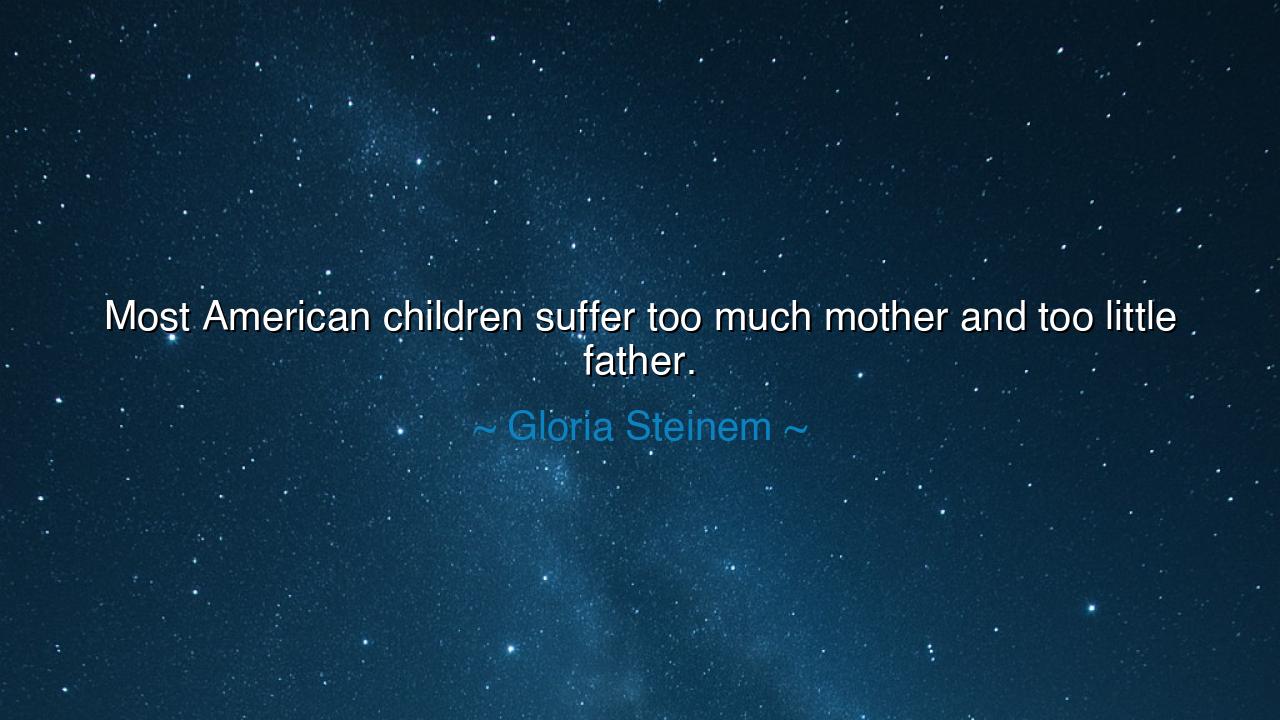
Most American children suffer too much mother and too little






The words of Gloria Steinem cut with clarity and urgency: “Most American children suffer too much mother and too little father.” In this saying she does not diminish the love of mothers, nor the necessity of their closeness, but she shines a light on an imbalance—an ancient imbalance still alive in modern households. The weight of parenting has too often fallen upon the shoulders of women, while men, though essential, are too easily excused from the deep work of nurture. Children are left hungry for the steady hand of a father’s presence, his guidance, his affection, his example. And this absence leaves scars that ripple through generations.
The ancients spoke of balance in all things—yin and yang, sun and moon, fire and water. The child, too, thrives in balance. The embrace of the mother brings comfort, gentleness, and safety, while the presence of the father brings stability, strength, and affirmation. When one is overburdened and the other absent, the harmony is broken. The mother, though heroic, becomes exhausted under the weight of doing all, while the father, whether by neglect or by cultural excuse, denies the child the fullness of love he or she deserves. Steinem calls us to see this imbalance for what it is: not natural destiny, but a failure of society’s expectations.
History gives us vivid examples of this truth. In the aftermath of wars, when fathers did not return, mothers bore the impossible burden of raising families alone. Though they labored with courage, the absence of fathers often left children searching for role models, yearning for the masculine voice that might have balanced the household. Conversely, in times and cultures where fathers were present—teaching sons to labor, guiding daughters with protection and pride—children grew stronger in confidence and wholeness. The story of Abraham Lincoln comes to mind: his father, though not gentle, still imparted lessons of resilience, while his stepmother, Sarah Bush Lincoln, gave love and warmth. It was the combination of both that allowed him to rise from poverty to greatness.
Steinem’s words also carry a critique of cultural expectations. Society often demands that mothers give endlessly, while praising fathers for the smallest contribution. A mother is judged for every failure, criticized for too much closeness, while a father is excused for distance, even absence. Thus, children grow up with too much mother not because her love is excessive, but because her presence is forced to fill the void left by too little father. This is not a criticism of maternal devotion, but a cry for justice: that men must rise to share equally in the sacred work of parenting.
The wisdom here is not only about fairness to mothers, but about healing for children. A child with only one pillar to lean upon grows unsteady. Both mother and father offer unique strengths, and when one is missing, the child’s foundation is weakened. To restore balance is to restore harmony, to give children the fullness of love they were born to receive. Steinem’s words remind us that equality in parenting is not only about justice for women, but about the health of future generations.
The lesson for us is plain: fathers must not be absent, either in body or in spirit. Their presence matters—not only in providing bread, but in offering time, guidance, and love. To “show up” as a father is to shape identity, to affirm worth, to model responsibility. Children need to see both tenderness and strength, both discipline and compassion, woven together in the tapestry of family life. Without it, they are left to piece together fragments on their own.
Practically, this means fathers must be intentional. Read to your children, play with them, teach them, guide them. Do not stand as a guest in the household, but as a pillar beside the mother, equal in responsibility, equal in devotion. For mothers, it means allowing space for fathers to step in, resisting the burden of doing all things alone. For society, it means ceasing to praise men for mere crumbs of involvement, and instead expecting the fullness of commitment.
Thus, Gloria Steinem’s words endure as both critique and command: “Too much mother, too little father.” Let us not interpret this as a rejection of mothers’ love, but as a rallying cry for fathers to rise to their rightful place. For when mothers and fathers stand together, sharing the sacred burden of raising children, the balance of life is restored, families are strengthened, and children are given the foundation to grow whole, strong, and unbroken.






AAdministratorAdministrator
Welcome, honored guests. Please leave a comment, we will respond soon